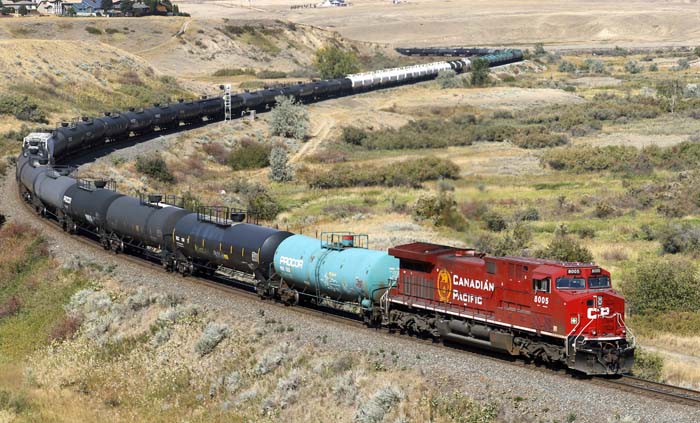
6 Sep 2018 Photographer unknown.
Reach Better Contracts with Producers
Calgary Alberta - Delays in building new pipelines have reshaped the volatile business of hauling Alberta crude by train into one with a
longer lifespan, says Keith Creel, chief executive officer of Canadian Pacific Railway Ltd.
Calgary-based CP is reaching longer-term contracts at better prices with oil producers eager to move their rising production to U.S. markets, CP said on
Tuesday.
Mr. Creel cautioned he believes the crude-by-rail volumes will fall within five years when the three major proposed projects are operating, and he is reluctant
to make large capital investments to serve the energy sector.
But he told analysts on a conference call on Tuesday the pipeline delays will extend the crude-by-rail boom for longer than the two to three year timeline
industry watchers and participants have expected.
"There is so much uncertainty with the pipelines that a three to four to five year discussion with producers and shippers is possible," Mr.
Creel said.
"I still believe that pipelines will be built. There's too much of a critical need. There's just a lot of noise and a lot of hoops and obstacles to get
through, but they will come."
A handful of proposed pipelines have been cancelled, leaving three major projects in various stages of lengthy approval processes, the Trans Mountain pipeline
to the West Coast, Enbridge's Line 3 replacement to the east, and the Keystone XL pipeline to the U.S. Gulf Coast.
The lack of pipeline space, compounded by rising oil production, has driven new volumes to the rails and caused oil-patch crude to be discounted.
Canadian crude exports by railway to the United States rose to a record level in 2018 after price declines caused a sharp drop from the previous peaks in 2013
and 2014.
Volumes are on pace to be even higher in 2019.
Canada's National Energy Board says railways moved a total of 25.8 million barrels of oil to the United States in the first four months of 2019, a rise of 34
percent from the same period in 2018.
CP hauled 25,000 carloads in the second quarter, up from 20,000 in the year-ago period, and could move 30,000 in the third-quarter volumes as prices improve
and production curtailment imposed by the Alberta government eases, said John Brooks, CP's marketing chief.
Still, Mr. Creel said he will not make large capital investments in new oil terminals or other assets to serve a "volatile and unpredictable" oil
market.
"We're making 30, 40 year, asset decisions at this company. We're not going to extend our capital or overextend our company based on a four or five year
opportunity," he said on the call, held to present the company's second-quarter financial results.
CP on Tuesday posted a 13 percent jump in second-quarter revenue to $1.98 billlion as Canada's second biggest railway moved more oil, grain, and other
commodities.
CP said profit for the three months ending 30 Jun 2019 rose to $724 million, or $5.17 a share, compared with $436 million ($3.04) in the second quarter of
2018.
CP's operating ratio, a closely watched industry measure of costs versus sales, improved to 58.4 percent from 64.2 percent in the year-ago period.
Investors responded to CP's earnings by driving up the share price by more than 3 percent on the Toronto Stock Exchange.
Before Tuesday, CP shares had risen by 27 percent in 2019, outpacing the 15 percent gain on the TSX and the 21 percent increase in the share price of rival
Canadian National Railway Co.
Christian Wetherbee, a stock analyst at Citigroup, said CP's financial performance was better than he expected, as yields improved amid cost
containment.
"Expectations were elevated coming into the quarter, but the results were solid and CP stands out as likely the only Class 1 railway that can credibly
maintain its volume target, so we think the results and outlook are good enough to drive shares higher and we reiterate our "Buy" recommendation, he
said in a research note.
CP saw eight of nine freight categories rise in volumes, led by energy, chemicals, and plastics (up 22 percent), potash (up 15 percent), and automotive
products (up 12 percent).
Mr. Brooks, CP's marketing chief, said the railway is anticipating heavy grain volumes for the rest of the season due to a crop that is expected to be in line
with the past two years, and large amounts of canola still in bins and elevators after China ceased importing the Canadian seed.
Eric Atkins.
provisions in Section 29 of the Canadian
Copyright Modernization Act.

